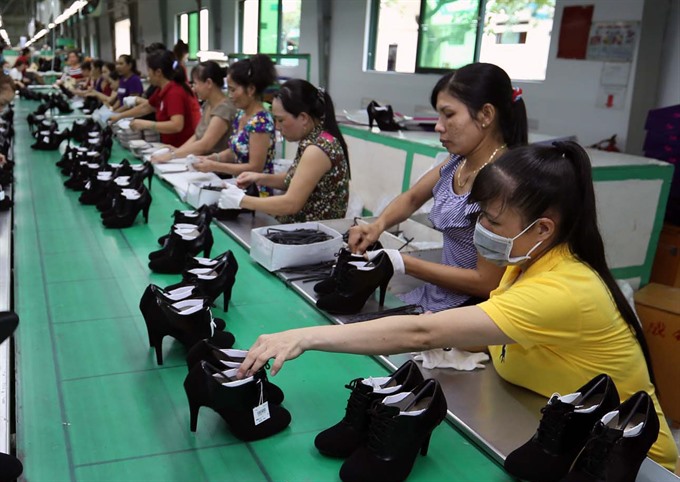 Society
Society

Viet Nam has posted the highest regional increase in minimum wages over the last three years, more than Indonesia and China, but workers still struggle to make ends meet.
 |
| Workers at an assembly line at the Mỹ Phong Shoes Joint Stock Company in Châu Thành District in the southern province of Hậu Giang. The company specialises in footwear production and exports and is able to provide jobs for some 14,000 locals. — VNA/VNS Photo Vũ Sinh |
HÀ NÔI – Viet Nam has posted the highest regional increase in minimum wages over the last three years, more than Indonesia and China, but workers still struggle to make ends meet.
Things are not likely to change with the latest increase, set to take effect next month, local reports say.
From July 1, the basic salary for civil servants and public employees will increase seven per cent to VNĐ1.3 million (about US$57.2) from the current VNĐ1.21 million.
The new basic salary, used for calculating payrolls and allowances, will apply for public officials, public employees working in State agencies and civil service providers of the Party or the Government, State-funded socio-political organisations and the armed forces.
Lê Đình Quảng, deputy head of the Labor Relations department of the Việt Nam General Confederation of Labor, said that the government had plans to increase minimum wage for employees every year to improve living standards.
However, the current minimum wage increase only met 90 per cent of the minimum living standard needs of workers and their families.
Even workers of businesses that pay higher than the minimum wage, VNĐ4-5 million per month, face many difficulties in daily lives.
An overwhelming majority of workers, 97 per cent, did not want to work overtime, but had no choice but to do so, just to make ends meet, Quảng told the Hải Quan (Customs) newspaper.
The newspaper reports that from 2014 to 2016, Việt Nam had the highest regional minimum wage increase of nearly 14 per cent, against seven per cent in Indonesia and 10 per cent in China.
Many people wonder why such an increase is unable to meet workers’ demands, the report says.
The reason is that Việt Nam’s minimum wage is only higher than Laos and Cambodia and lower than most countries in Southeast Asia like Thailand, Malaysia or Singapore, it explains.
The real wage of workers is still very low, it is not high enough to cover workers’ basic needs because the costs of many services also increase along with the minimum wage.
In fact, in some enterprises, the real income of workers reduce when the minimum wage increases.
Some business owners also threaten to cut their workforce if production costs increase because of higher wages.
The results of study by the ISEAL Alliance – the global association for sustainability standards and social accountability – released at a seminar in Hà Nội recently showed that an employee in HCM City must be paid more than VNĐ6.4 million a month to meet their daily expenses.
The salary was calculated by the research team on the basis of what a household of two adults and two children spend a month.
Unfortunately, the average salary of a worker in the garment sector, a major employer, is just over VNĐ4.8 million a month.
According to the study, at a monthly wage of VNĐ6.4 million, an employee may save VNĐ488,000 per month, five per cent of the income after spending for food, housing fee, insurance and other needs.
The study estimates that for rural areas, in two surveyed provinces of Sóc Trăng and Thái Bình, a worker needs at least VNĐ3.99 million a month, but the current average salary in these localities is just VNĐ3.2 million.
Most employers pay only minimum wage, which is not enough to meet actual minimum living costs, forcing workers to work overtime to make ends meet, the study found.
Workers are, therefore, left wondering if and when they will be able to meet daily expenses and save some money for a rainy day.
Bùi Sỹ Lợi, Deputy Chairman of the National Assembly’s Social Affairs Committee, said the minimum wage must be adjusted based on socio-economic development and workes should be compensated in accordance with market mechanisms.
Currently, the minimum wage is based on food prices, which is inadequate. Therefore, authorised agencies must re-calculate the minimum wage so as to ensure the benefits of employees, especially when they retire, while creating favourable conditions for business growth, he said. - VNS




